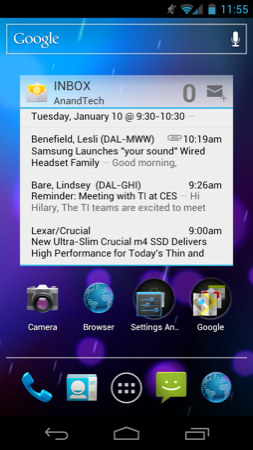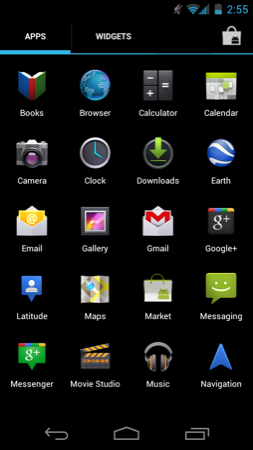Samsung Galaxy Nexus & Ice Cream Sandwich Review
by Brian Klug & Anand Lal Shimpi on January 18, 2012 1:34 PM ESTGoogle employs more than 20,000 people worldwide and the number of them working on Android are in the single digit percentage range. Google's business is search, but it has always had aspirations of more. Android isn't just a chance to capitalize on mobile search for Google, it's also an opportunity to grab power in the next era of personal computing. If you believe that smartphones will eventually replace mainstream PCs, who wouldn't want to be to smartphones what Microsoft was to PCs in the early 1990s?
Previous versions of Android have been cautious, evolutionary steps along a path to being a more open/flexible alternative to iOS. Starting with Honeycomb (Android 3.0) however, Google began to step out of the shadow of its competitors and really start to define Android as a mobile computing platform. Honeycomb was limited to tablets but its successor, Ice Cream Sandwich (Android 4.0), would bring unification to Android across both tablets and smartphones.
Today we look at both ICS and its launch vehicle, Google's Galaxy Nexus.
The Android vs. iOS Debate
It's very clear to me now more than ever that Apple and Google have completely different goals with their mobile OS strategies. Excluding the unclear strategy behind Chrome OS, Android is pretty much Google's primary operating system. The unified tablet/smartphone strategy behind Ice Cream Sandwich makes sense because for Google to succeed in the OS business it needs to deploy Android on everything from smartphones to notebooks. We've already seen the strengths in having a smartphone platform with a strong app ecosystem. Things become even more appealing if you have a phone, tablet and PC that all run the same OS and apps. As Android is Google's one-size-fits-all operating system, it needs to have a broader and slightly more ambitious focus than iOS otherwise it risks losing the race in the long run.
Apple is in a different position. It already has a successful desktop/notebook OS that is continuing to grow. While iOS has been a runaway success for Apple, the Mac OS X platform is a solid option for any user who needs more than their iPhone or iPad can provide. The two OSes may converge or at least borrow heavily from one another, but in the interim they can remain independent. If you need more of a computing experience Apple is happy to sell you a Mac. If you want the it-just-works appliance experience in your phone or tablet, Apple has a whole bunch of iPhone/iPad configurations to offer you.


ICS isn't a step towards iOS. If anything it proves that Google is committed to its own trajectory. Android is an OS that, although more closed than many would like, still allows more flexibility than iOS. You can sideload apps not purchased in the Market. The file system isn't completely hidden from you. You can even override the default zoom level on web pages. Apple and Google both pour tons of time and research into figuring out the best way to do something. And, to be honest, I feel like Apple generally does a better job of "getting it" for the very mainstream consumer. Rather than attempt to make the perfect mold however, Google gives you one that's a bit more flexible.
I've said this before but I do believe that Apple is trying to deliver more of an appliance experience, whereas Google is providing you with a modern take on a traditional computing experience. If the appliance is a smartphone, then both approaches are equally capable - it's just a matter of personal preference.
What's new in ICS really falls into one of three categories:
- Improvements in UI frame rate due to OpenGL ES rendering (non-skia) path
- UI tweaks
- New features
Nowhere in this list is a fundamental change in the way Android works. I feel that this is a very important point to understand and likely the cause for lots of disagreement when it comes to just how impressive (or not) ICS is.
ICS is smoother, more polished and has its own set of new features that make it a significant step forward for Android. What ICS is not however is an outright clone of iOS. If you prefer the iOS experience to Android, ICS will do nothing to change your opinion. If all you were missing from Android was a smoother UI, then its fourth major release should be almost everything you could ask for.










185 Comments
View All Comments
gamoniac - Wednesday, January 18, 2012 - link
The article is co-authored, yet I keep seeing the use of "I" as the pronoun in sentences throughout. As a daily AT reader, I find it a bit awkard when trying to put a face to the article. I like the writing style; it just bugs me when I can't figure out whether it is Anand or Brian who is making the statement that I am reading. Perhaps the use of "we" makes more sense?Thanks. Great work as usual.
Omid.M - Wednesday, January 18, 2012 - link
As an editor, I agree with this comment.It's not a huge deal, but it's nice to see:
AL: I think that...
BK: I disagree with Anand, but...
Just don't do it everywhere because it'll seem like an interview.
Anand,
The videos have been the best new thing AT has done in a long time. Thanks! Good to put faces to names, even better to add voices. Next, comment system ;)
@moids
-Omid
bjacobson - Wednesday, January 18, 2012 - link
Perhaps writers at Anand should be required to speak in terms of The Collective.Brian Klug - Thursday, January 19, 2012 - link
This is definitely something we've struggled with in the past and admittedly continue to struggle with. Most of ICS is Anand (though we collaborated and always wind up agreeing about most things), then the hardware and onwards is myself.Think of us as a hivemind (or collective) and the problem goes away :P
-Brian
Zoomer - Thursday, January 19, 2012 - link
Or write in 3rd person like a technical paper. Though that can be boring to read.just4U - Friday, January 20, 2012 - link
"Think of us as a hivemind (or collective) and the problem goes away :P-Brian"
------
It does NOT!! Ok, which bonehead asimilated Brian & Anand? There goes the neighborhood (...grin)
thebitdnd - Wednesday, January 18, 2012 - link
I've had my GNex since the day after launch. It surpasses any experience I've had with a smartphone (including HTC Incredible, iPhone 3GS, and a HTC EVO) as a web browser and mobile computer device, but the single complaint I have is with using it as a...(wait for it) PHONE.I've had over a dozen calls now where I'll be conversing away and all of the sudden my microphone cuts out and the other person can't hear a word I'm saying. The call is still connected and I can hear them just fine, but I have to hang up each time and call them back.
Google directed me to Verizon, Verizon says it's a Samsung/Google problem, but I've been assured it's a software problem and there will be a fix in 'an upcoming update'.
As much as I like the hardware and software, not making reliable calls is a real kick in the junk for a smartphone.
jalexoid - Wednesday, January 18, 2012 - link
Well, what did you want with CDMA or LTE? No bugs?mhaager2 - Wednesday, January 18, 2012 - link
Great review as always Anand. My only criticism is that it felt like it took you a very long time to get this review out compared to how quickly the iphone 4S review came out. I think your comments about the hardware are correct; its certainly not leaps and bounds ahead of other phones. Being my first phone since the iphone 3G I do wish it was more bleeding edge to future proof it a bit. However it actually works very well, both as a content consumption device, as well as (gasp) as a phone, and I just love, love, love that fact that its penta band. Now when I visit the US I no longer have to endure the legal extortion that used to be the norm with carrier locked devices. That feature alone makes this phone better than any other out there,, old GPU and all.Has anyone overclocked this to its 1.5 ghz spec? I wonder if there is any appreciable differerence and what the battery life trade off is.
tipoo - Wednesday, January 18, 2012 - link
I can only speak from my experience with my Nexus S, but the max CPU speed has little battery life impact compared to the impact the CPU governor does. 1.3GHz with the Lazy governor (available in Trinity Kernel) lasts longer than the stock 1GHz on OnDemand.